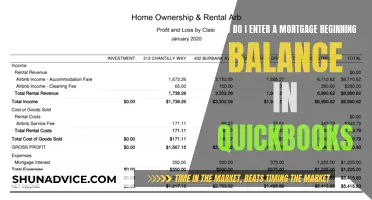
Debt consolidation is a financial strategy that combines multiple debts into a single loan with one monthly payment. For homeowners, consolidating debt into a mortgage is an effective way to streamline finances and reduce interest rates. This process, known as a debt consolidation mortgage, involves refinancing an existing mortgage to include other high-interest debts, such as credit card balances, personal loans, and auto loans. While consolidating debt in a mortgage can provide financial benefits, it may require a larger down payment, result in higher long-term interest costs, and pose certain risks. It is important to carefully consider one's financial situation and seek professional guidance before making any decisions.
| Characteristics | Values |
|---|---|
| Possibility | It is possible to consolidate debt into a mortgage |
| Applicability | Applicable to existing homeowners and first-time homebuyers |
| Requirements | A good credit score (670 or above) and a large down payment |
| Benefits | Simplify finances, reduce interest rates, lower monthly payments, improve cash flow, save money |
| Drawbacks | Requires a large down payment, higher long-term interest, poses certain risks, takes longer to pay off home, impacts home equity |
| Alternatives | Debt consolidation loan, home equity loan, line of credit (HELOC), balance transfer credit card |
What You'll Learn

Pros and cons of consolidating debt into a mortgage
Debt consolidation in a mortgage is certainly possible and might make financial sense in specific situations. However, it often requires a larger down payment, could mean paying more in long-term interest, and poses certain risks.
Pros
Consolidating your debt into your mortgage can simplify the process of paying it off. You will have just one payment at a much more favourable interest rate than high-interest credit cards, personal loans, and auto loans. This can also reduce the total interest paid over time and lower your monthly payments.
Cons
You will be borrowing more than your current mortgage balance, so your monthly mortgage payments will be higher. A debt consolidation loan will also mean you’re paying more mortgage interest over the life of the loan. If you are a first-time homebuyer, you will likely need a larger down payment and a good credit score.
Comparing Mortgage Offers: What You Need to Know
You may want to see also

How to get approved for a debt consolidation mortgage
Debt consolidation is a financial strategy that combines multiple debts into a single loan with one monthly payment. This can simplify your finances and potentially reduce your interest rates. A debt consolidation mortgage involves refinancing your existing mortgage to include other debts, such as credit card balances, personal loans, and auto loans.
Understand the Requirements and Your Financial Situation:
Before applying for a debt consolidation mortgage, it's important to understand the eligibility requirements set by lenders. These requirements can vary, but generally, a good credit score is essential. Calculate your credit score and assess your financial health by considering factors such as your debt-to-income ratio (DTI) and existing debts.
Compare Lenders and Shop for Rates:
Different lenders will offer varying interest rates and terms for debt consolidation mortgages. It's worth comparing multiple lenders to find the most favourable rates and conditions that align with your financial goals. Online tools and marketplaces can assist in this process.
Prepare the Necessary Documentation:
Lenders will typically require proof of income and identity when applying for a debt consolidation mortgage. Gather the necessary documents, such as W-2s, pay stubs, tax returns, birth certificates, driver's licenses, or passports, to streamline the application process and increase your chances of approval.
Consider the Costs and Benefits:
Debt consolidation mortgages can provide long-term benefits, such as lower interest rates compared to credit cards and personal loans. However, be mindful of potential costs, including a larger down payment, higher long-term interest, and changes to the terms of your original mortgage agreement. Understand the loan's length of term, fees, and interest rate before committing.
Seek Professional Guidance:
Consulting a certified financial planner or advisor can be beneficial. They can help you develop a comprehensive budget and debt repayment plan, ensuring that debt consolidation is the right choice for your financial situation.
While debt consolidation mortgages can provide benefits, it's essential to carefully consider your unique circumstances and seek professional advice before proceeding.
Becoming a Mortgage Advisor: Steps to Independence
You may want to see also

How to improve your credit score
Consolidating debt into a mortgage can be a good way to streamline your finances and improve your financial health. However, it's important to note that it often requires a larger down payment and could result in paying more in long-term interest. Additionally, your credit score may dip temporarily when you apply for a consolidation loan or any type of credit because the lender carries out a hard search of your credit file. This search stays on your report for 12 months.
- Make timely payments: Paying your bills and loan instalments on time is crucial for improving and maintaining a good credit score. Late or missed payments can negatively impact your score and stay on your credit report for several years, affecting your eligibility for loans and mortgages.
- Reduce credit card usage: If you have multiple credit cards, try to reduce your usage and focus on paying off the balances. A lower credit card utilisation rate can improve your credit mix, which is favourable for your credit score.
- Maintain a low debt-to-income ratio: Lenders consider your debt-to-income ratio (DTI) when evaluating your creditworthiness. A high DTI indicates that a significant portion of your income is dedicated to debt repayment, which may make it challenging to obtain new credit. Aim for a lower DTI by reducing your debt or increasing your income.
- Limit credit applications: Each time you apply for credit, a hard inquiry is recorded on your credit report, which can temporarily lower your score. Space out your credit applications and only apply for credit when necessary.
- Build a long credit history: Lenders prefer borrowers with a lengthy credit history, as it provides more data to assess creditworthiness. Maintaining old credit accounts in good standing and using them occasionally can help extend your credit history.
- Use a mix of credit types: Demonstrating responsible management of different credit types, such as credit cards, mortgages, and personal loans, can enhance your credit score. However, only take on additional credit if you can comfortably manage the payments.
- Monitor your credit report: Regularly review your credit report for accuracy and dispute any errors. This proactive approach ensures that any incorrect negative information is corrected, and you can address any potential issues promptly.
Assessing Subprime Mortgage Investment: A Comprehensive Guide
You may want to see also

Alternatives to consolidating debt into a mortgage
Debt consolidation into a mortgage can be a powerful tool for managing your finances. However, it may not be the right fit for everyone. Here are some alternatives to consolidating debt into a mortgage:
- Debt consolidation loan: This is a personal loan used to pay off multiple debts. It can offer lower interest rates compared to credit cards and provides a fixed repayment schedule. However, the interest rate on a debt consolidation loan might still be higher than that of a mortgage.
- Home equity loan or line of credit (HELOC): You can use your home equity to take out a loan or a line of credit, also known as a "second mortgage." These options allow you to borrow against the value of your home, but the rates are typically higher than those associated with first mortgages. A HELOC offers more flexibility than a home equity loan, functioning like a credit card, while a home equity loan provides a lump sum.
- Balance transfer credit card: If you have a good credit score, you may be eligible for a balance transfer credit card with a 0% introductory interest rate. This can be a temporary solution to help you manage your debt.
- Refinancing your existing mortgage: Instead of consolidating your debt into a new mortgage, you can refinance your current mortgage to include other debts. This option can simplify your finances and potentially reduce your interest rates, especially if you have high-interest loans. However, refinancing your mortgage may result in different interest rates and changes to the terms of your original agreement.
- Seek professional guidance: Consult a certified financial planner or credit counsellor to help you develop a budget and debt repayment plan. They can provide personalised advice based on your unique financial situation and goals.
Remember, it is important to carefully consider the pros and cons of each alternative and seek professional guidance when making financial decisions.
Changing Mortgage Deeds: A Guide to Name Amendments
You may want to see also

How to save money through debt consolidation
Debt consolidation is a financial strategy that combines multiple debts into a single loan with one monthly payment. This can be a good way to save money, streamline your budget, and simplify your finances. It can also potentially reduce your interest rates and monthly payments.
There are several ways to consolidate debt, including debt consolidation loans, balance transfer credit cards, home equity loans or lines of credit, and consolidating debt into a mortgage.
Debt Consolidation Loans
Debt consolidation loans are a type of personal loan used to pay off multiple debts. They can offer lower interest rates compared to credit cards, and they provide a fixed repayment schedule. You can get a debt consolidation loan from a traditional lender, like a bank, or from an online peer-to-peer lending company.
Balance Transfer Credit Cards
If you have good or excellent credit, you may be able to qualify for a 0% balance transfer credit card. This allows you to transfer your existing credit card balances onto the new card and pay it off with zero interest during the promotional period, which can save you money.
Home Equity Loans or Lines of Credit
If you are a homeowner, you can take out a loan or line of credit (HELOC) using your home equity. These are considered "second mortgage" options and allow you to borrow against the value of your home. Interest rates on equity lines of credit are typically lower compared to other loans, and you can borrow up to 65% of your home's appraised value.
Consolidating Debt into a Mortgage
If you are a homeowner, you may be able to consolidate your debt into your mortgage. This involves refinancing your existing mortgage to include other debts, such as credit card balances, personal loans, and auto loans. However, this option may require a larger down payment and could result in paying more in long-term interest. It is important to carefully consider the pros and cons before choosing this option.
Overall, debt consolidation can be a helpful way to save money and simplify your finances, but it is important to do your research and consider all the options before making any decisions.
Becoming a Mortgage Processor: A Step-by-Step Guide
You may want to see also
Frequently asked questions
Debt consolidation is a financial strategy where multiple debts are combined into a single loan with one monthly payment. This can simplify your finances and potentially reduce your interest rates.
Debt consolidation in a mortgage is a type of cash-out refinancing. This allows homeowners to borrow more than they owe on their current mortgage and use the difference to pay off other debts.
Consolidating debt into a mortgage can help you save money by reducing the overall interest you pay. This is because mortgages typically have lower interest rates compared to other types of debt, such as credit cards.
Consolidating debt into a mortgage often requires a larger down payment and could mean paying more in long-term interest. It also eliminates your home equity, which can be a safety net if you need to sell your home or access that money for another purpose.
It's important to seek advice from trusted professionals when making decisions about your financial situation. You can talk to a mortgage lender or loan officer, who will ask about your financial goals and situation and provide you with options.







